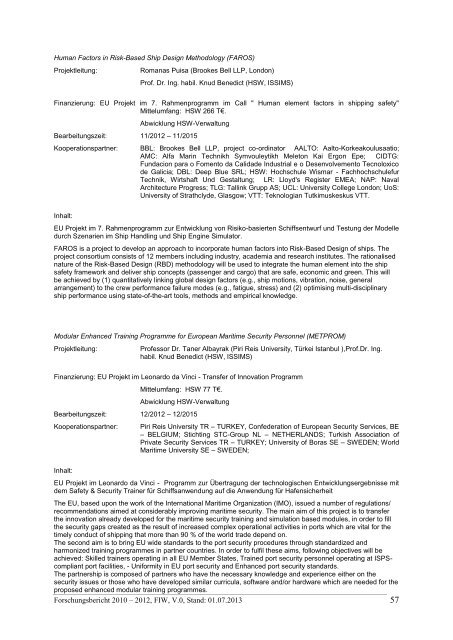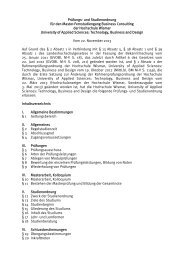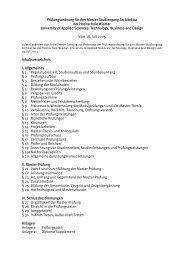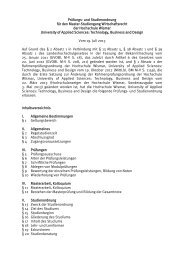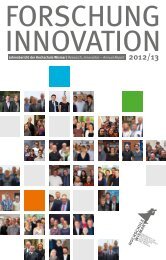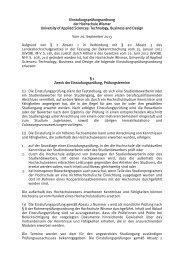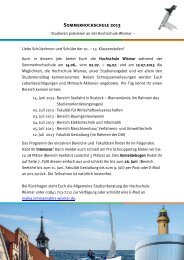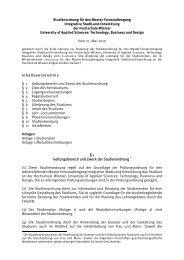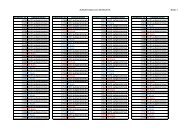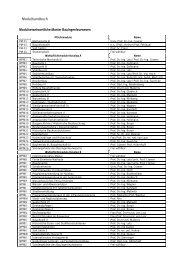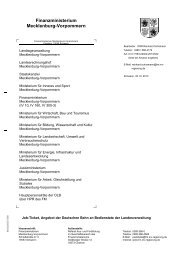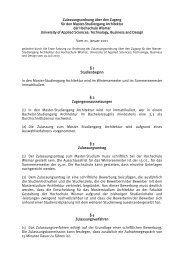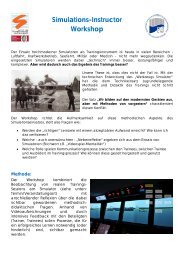Forschungsbericht der Fakultät für Ingenieurwissenschaften 2010
Forschungsbericht der Fakultät für Ingenieurwissenschaften 2010
Forschungsbericht der Fakultät für Ingenieurwissenschaften 2010
Sie wollen auch ein ePaper? Erhöhen Sie die Reichweite Ihrer Titel.
YUMPU macht aus Druck-PDFs automatisch weboptimierte ePaper, die Google liebt.
Human Factors in Risk-Based Ship Design Methodology (FAROS)<br />
Projektleitung:<br />
Romanas Puisa (Brookes Bell LLP, London)<br />
Prof. Dr. Ing. habil. Knud Benedict (HSW, ISSIMS)<br />
Finanzierung: EU Projekt im 7. Rahmenprogramm im Call " Human element factors in shipping safety"<br />
Mittelumfang: HSW 266 T€.<br />
Abwicklung HSW-Verwaltung<br />
Bearbeitungszeit: 11/2012 – 11/2015<br />
Kooperationspartner: BBL: Brookes Bell LLP, project co-ordinator AALTO: Aalto-Korkeakoulusaatio;<br />
AMC: Alfa Marin Technikh Symvouleytikh Meleton Kai Ergon Epe; CIDTG:<br />
Fundacion para o Fomento da Calidade Industrial e o Desenvolvemento Tecnoloxico<br />
de Galicia; DBL: Deep Blue SRL; HSW: Hochschule Wismar - Fachhochschulefur<br />
Technik, Wirtshaft Und Gestaltung; LR: Lloyd's Register EMEA; NAP: Naval<br />
Architecture Progress; TLG: Tallink Grupp AS; UCL: University College London; UoS:<br />
University of Strathclyde, Glasgow; VTT: Teknologian Tutkimuskeskus VTT.<br />
Inhalt:<br />
EU Projekt im 7. Rahmenprogramm zur Entwicklung von Risiko-basierten Schiffsentwurf und Testung <strong>der</strong> Modelle<br />
durch Szenarien im Ship Handling und Ship Engine Simulator.<br />
FAROS is a project to develop an approach to incorporate human factors into Risk-Based Design of ships. The<br />
project consortium consists of 12 members including industry, academia and research institutes. The rationalised<br />
nature of the Risk-Based Design (RBD) methodology will be used to integrate the human element into the ship<br />
safety framework and deliver ship concepts (passenger and cargo) that are safe, economic and green. This will<br />
be achieved by (1) quantitatively linking global design factors (e.g., ship motions, vibration, noise, general<br />
arrangement) to the crew performance failure modes (e.g., fatigue, stress) and (2) optimising multi-disciplinary<br />
ship performance using state-of-the-art tools, methods and empirical knowledge.<br />
Modular Enhanced Training Programme for European Maritime Security Personnel (METPROM)<br />
Projektleitung:<br />
Professor Dr. Taner Albayrak (Piri Reis University, Türkei Istanbul ),Prof.Dr. Ing.<br />
habil. Knud Benedict (HSW, ISSIMS)<br />
Finanzierung: EU Projekt im Leonardo da Vinci - Transfer of Innovation Programm<br />
Mittelumfang: HSW 77 T€.<br />
Abwicklung HSW-Verwaltung<br />
Bearbeitungszeit: 12/2012 – 12/2015<br />
Kooperationspartner:<br />
Piri Reis University TR – TURKEY, Confe<strong>der</strong>ation of European Security Services, BE<br />
– BELGIUM; Stichting STC-Group NL – NETHERLANDS; Turkish Association of<br />
Private Security Services TR – TURKEY; University of Boras SE – SWEDEN; World<br />
Maritime University SE – SWEDEN;<br />
Inhalt:<br />
EU Projekt im Leonardo da Vinci - Programm zur Übertragung <strong>der</strong> technologischen Entwicklungsergebnisse mit<br />
dem Safety & Security Trainer <strong>für</strong> Schiffsanwendung auf die Anwendung <strong>für</strong> Hafensicherheit<br />
The EU, based upon the work of the International Maritime Organization (IMO), issued a number of regulations/<br />
recommendations aimed at consi<strong>der</strong>ably improving maritime security. The main aim of this project is to transfer<br />
the innovation already developed for the maritime security training and simulation based modules, in or<strong>der</strong> to fill<br />
the security gaps created as the result of increased complex operational activities in ports which are vital for the<br />
timely conduct of shipping that more than 90 % of the world trade depend on.<br />
The second aim is to bring EU wide standards to the port security procedures through standardized and<br />
harmonized training programmes in partner countries. In or<strong>der</strong> to fulfil these aims, following objectives will be<br />
achieved: Skilled trainers operating in all EU Member States, Trained port security personnel operating at ISPScompliant<br />
port facilities, - Uniformity in EU port security and Enhanced port security standards.<br />
The partnership is composed of partners who have the necessary knowledge and experience either on the<br />
security issues or those who have developed similar curricula, software and/or hardware which are needed for the<br />
proposed enhanced modular training programmes.<br />
<strong>Forschungsbericht</strong> <strong>2010</strong> – 2012, FIW, V.0, Stand: 01.07.2013 57


